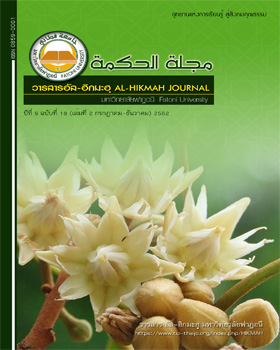หิกมะฮฺของการมีภรรยาหลายคนตามหลักกฎหมายอิสลาม และการนำไปใช้ของครอบครัวมุสลิมในจังหวัดนราธิวาส
The Wisdom of Polygamy in Islamic law and Application of the Muslim family In Narathiwat Province.
Keywords:
wisdoms, The polygamy, Muslims familyAbstract
The objectives of this study were 1) to study the principles and wisdoms of polygamy in Islamic laws, 2) to study the applications of polygamy of the Muslims family in Islamic Laws in Narathiwat province. This research was a qualitative research by using document research and in-depth Interview, colleted Muslims family having polygamy 5 families in Narathiwat Province.
The results found that:
- Islam provide a complete way of life and cover in all their dimension. The rulings on permits plural marrige is a righteous following to the nature of man life. Its also creat balanced the number of women in a society that the number of woman is greater than the number of men in age.
- The applications in creating the islamic way of the muslims family including polygamy in Narathiwat province have several issue, such as 1.Justice or Fairness 2.The ability to spend on one' wives 3.To give household 4. Equally in spending the night with them 5.Taking care of his family The almost successful to apply the polygamy of muslims family caused by person in the family to have deep understandings in principles, rulings, wisdoms of polygamy. That is to say, Muslims family have more the knowledge and understanding can apply it than muslims family have few the understanding as low to lowest.
References
มุฮำหมัดซากี เจ๊ะหะ. (2011). บทบัญญัติเกี่ยวกับสตรีในอิสลาม.
มหาวิทยาลัยอิสลามยะลา.
สุภางค์ จันทวานิช. (2546). วิธีการวิจัยเชิงคุณภาพ. กรุงเทพฯ :
จุฬาลงกรณ์มหาวิทยาลัย.
Abu Abdu al-Rahman. (1991). Faḍlu Ta‘addadu al-Zawjāt.
Dār al-manār.
Abdullah Naṣih ‘Ulwan. n.d. Ta‘addadu al-Zawjāt Fī al-Islām Wa Hikmah Ta‘addadu Fī al-Nabiy. Dār al-Salām.
Abdu al-Tawwab Haikal. n.d. Ta‘addadu al-Zawjāt Fī al-Islām Wa Hikmah Ta‘addadu Fī al-Nabiy. Bairūt : Dār al-Qalam
Abdu al-Nāṣir Tawfīq al-Aṭṭār. (1972). Ta‘addadu al-Zawjāt Min al-Nawāhiy al-Dīniyyah Wa al-Ijtimā‘iyyah Wa al-Qanūniyyah. Gozzah.
Ahmad al-Huṣọīn. (1990). Limādhā al-Hujūm ‘Ala Ta‘addadu al-Zawjāt. al-Riaḍ : Dār al-Ḍiyā’a.
al-SaiyidSabiq. (1994). Fiqh al-Sunnah. Cairo :
Dār al- Fath Li al- I’ilami al-arabiy.
al-Bukhariy, Muhammad Bin Ismail. (1400). al-Jami‘i al-Sahīh. Egypt :
al-Maktabah al-Salafiyah.
Bunaidir Bin Muqbil al-Haisūniy. n.d. Da‘awah Ila Ta‘addadu al-Zawjāt.
Dār al-ṣami‘iiy.
Khālid Bin Abdu al-Rahmān al-Jeraisiy. (1999). Faḍlu Ta‘addadu al-Zawjāt. al-Riaḍ : Maktabah al-Malik Fahad al-Waṭoniyyah.
Muhammad Bin Musfir Bin Husayn al-Ṭawīl. (2004). Ta‘addadu al-Zawjāt Fī al-Islām. Maktabah Mishkāh al-Islāmiyah.
Mustafa al-Siba‘iiy. (1999). al-Mar’aah Baina al-Fiqh Wa al-Qānūn. al-Riaḍ :
Maktabah al-Waraq.
Zakir Naik, Zakir Abdu al-Karīm Naik. nd. Answer To Non-Muslims’ Common Questions About Islam. Islamic Research Foundation.
รูดียะห์ หะ. (2556). การบริหารจัดการในครอบครัวมุสลิมที่มีภรรยาหลายคนในอำเภอเมือง จังหวัดปัตตานี.
ศิลปศาสตร์มหาบัณฑิต มหาวิทยาลัยสงขลานครินทร์.
อาหมัด อัลฟารีตีย์. (2547). สิทธิและหน้าที่ของภริยาตามกฎหมายอิสลาม: ศึกษากรณีการปฏิบัติในจังหวัดปัตตานี.
ศิลปศาสตร์มหาบัณฑิต มหาวิทยาลัยสงขลานครินทร์.
มหาวิทยาลัยอิสลามยะลา.
สุภางค์ จันทวานิช. (2546). วิธีการวิจัยเชิงคุณภาพ. กรุงเทพฯ :
จุฬาลงกรณ์มหาวิทยาลัย.
Abu Abdu al-Rahman. (1991). Faḍlu Ta‘addadu al-Zawjāt.
Dār al-manār.
Abdullah Naṣih ‘Ulwan. n.d. Ta‘addadu al-Zawjāt Fī al-Islām Wa Hikmah Ta‘addadu Fī al-Nabiy. Dār al-Salām.
Abdu al-Tawwab Haikal. n.d. Ta‘addadu al-Zawjāt Fī al-Islām Wa Hikmah Ta‘addadu Fī al-Nabiy. Bairūt : Dār al-Qalam
Abdu al-Nāṣir Tawfīq al-Aṭṭār. (1972). Ta‘addadu al-Zawjāt Min al-Nawāhiy al-Dīniyyah Wa al-Ijtimā‘iyyah Wa al-Qanūniyyah. Gozzah.
Ahmad al-Huṣọīn. (1990). Limādhā al-Hujūm ‘Ala Ta‘addadu al-Zawjāt. al-Riaḍ : Dār al-Ḍiyā’a.
al-SaiyidSabiq. (1994). Fiqh al-Sunnah. Cairo :
Dār al- Fath Li al- I’ilami al-arabiy.
al-Bukhariy, Muhammad Bin Ismail. (1400). al-Jami‘i al-Sahīh. Egypt :
al-Maktabah al-Salafiyah.
Bunaidir Bin Muqbil al-Haisūniy. n.d. Da‘awah Ila Ta‘addadu al-Zawjāt.
Dār al-ṣami‘iiy.
Khālid Bin Abdu al-Rahmān al-Jeraisiy. (1999). Faḍlu Ta‘addadu al-Zawjāt. al-Riaḍ : Maktabah al-Malik Fahad al-Waṭoniyyah.
Muhammad Bin Musfir Bin Husayn al-Ṭawīl. (2004). Ta‘addadu al-Zawjāt Fī al-Islām. Maktabah Mishkāh al-Islāmiyah.
Mustafa al-Siba‘iiy. (1999). al-Mar’aah Baina al-Fiqh Wa al-Qānūn. al-Riaḍ :
Maktabah al-Waraq.
Zakir Naik, Zakir Abdu al-Karīm Naik. nd. Answer To Non-Muslims’ Common Questions About Islam. Islamic Research Foundation.
รูดียะห์ หะ. (2556). การบริหารจัดการในครอบครัวมุสลิมที่มีภรรยาหลายคนในอำเภอเมือง จังหวัดปัตตานี.
ศิลปศาสตร์มหาบัณฑิต มหาวิทยาลัยสงขลานครินทร์.
อาหมัด อัลฟารีตีย์. (2547). สิทธิและหน้าที่ของภริยาตามกฎหมายอิสลาม: ศึกษากรณีการปฏิบัติในจังหวัดปัตตานี.
ศิลปศาสตร์มหาบัณฑิต มหาวิทยาลัยสงขลานครินทร์.
Downloads
Published
2019-12-29
How to Cite
สามะ น., & แตอาลี อ. (2019). หิกมะฮฺของการมีภรรยาหลายคนตามหลักกฎหมายอิสลาม และการนำไปใช้ของครอบครัวมุสลิมในจังหวัดนราธิวาส: The Wisdom of Polygamy in Islamic law and Application of the Muslim family In Narathiwat Province. Al-HIKMAH Journal, 9(18), 57–67. retrieved from https://so01.tci-thaijo.org/index.php/HIKMAH/article/view/134820
Issue
Section
Research Article



